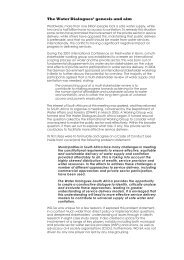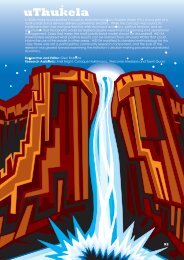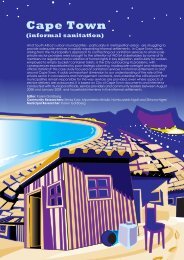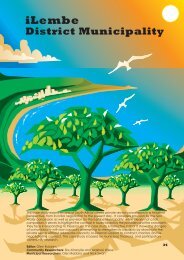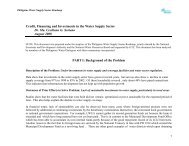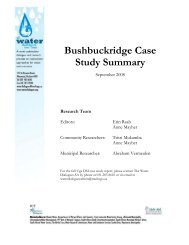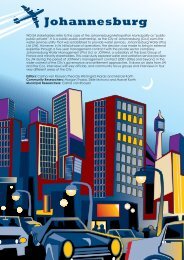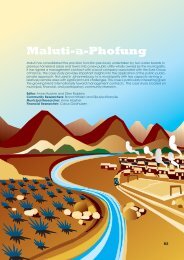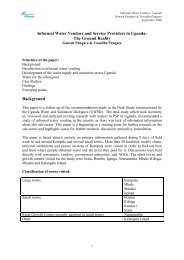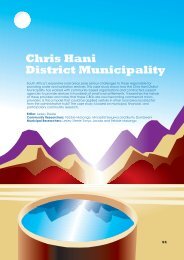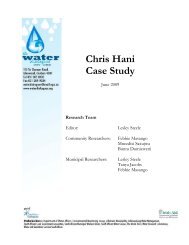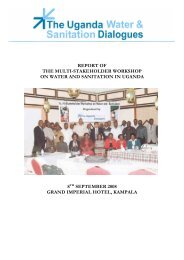Ugu Case Study Summary - The Water Dialogues
Ugu Case Study Summary - The Water Dialogues
Ugu Case Study Summary - The Water Dialogues
You also want an ePaper? Increase the reach of your titles
YUMPU automatically turns print PDFs into web optimized ePapers that Google loves.
<strong>The</strong> lack of focus on operations and maintenance has serious implications for the long-term<br />
sustainability of water systems. While there is an official register of assets, the asset management<br />
strategy is almost totally reactive. An asset management plan is reportedly in progress to seek<br />
to correct this problem.<br />
Additional funds will be needed for <strong>Ugu</strong> to be able to maintain new infrastructure at acceptable<br />
levels of services, particularly because the conditions of the municipal infrastructure grant<br />
expressly stipulate that it cannot be used for operations and maintenance.<br />
Finding 11: <strong>Ugu</strong> could improve its efficiency and the maintenance of its<br />
infrastructure through improved customer service and communication.<br />
<strong>Ugu</strong> DM has recently made changes to the organisational structure to promote better<br />
communication using different methods, including:<br />
An official DM website (http://www.ugu.org.za) has been set up with extensive information<br />
about policies, rates, tariffs, Integrated Development Plans and contact details;<br />
Project steering committees meet monthly in each community. <strong>The</strong> committees are made<br />
up of local residents and are primarily used for the identification of labour and pipe routes,<br />
and to inform residents of the indigent policy;<br />
Permanent Institutional and Social Development Officers are responsible for two local<br />
municipalities each. <strong>The</strong>se officers are in charge of raising awareness regarding water<br />
conservation and demand management. <strong>The</strong> officers also keep in touch with municipal<br />
councillors and traditional leaders about local water issues, and seek to circulate water<br />
trucks when service fails;<br />
Road shows: <strong>Ugu</strong> interacts with communities through mayoral road shows which are<br />
conducted at the end of the year. <strong>The</strong>se publicise the budget and plans of the municipality<br />
although not specifically for water and sanitation;<br />
Local media is used for communication of specific information or policies, such as the<br />
indigent policy. <strong>Ugu</strong> will take out newspaper advertisements, have radio interviews on<br />
Radio Sunny South, distribute posters or flyers with the information and/or send staff to do<br />
ad-hoc community visits to speak directly with users;<br />
<strong>The</strong>re is a user call centre where users can make inquiries or report complaints.<br />
Despite these efforts, users had very little knowledge of free basic services or municipal policies<br />
regarding water usage and extension of infrastructure, i.e. the fact that problems were being<br />
addressed. In particular there appears to be some ambiguity about the tariff system and<br />
affordability of water in <strong>Ugu</strong>, and about the municipality’s application of the FBW policy.<br />
In only one community did participants mention that some residents phone <strong>Ugu</strong> directly and<br />
few users had knowledge of the customer care call centre. Problems such as burst pipes or<br />
water cut offs, were generally reported to the local councillor or ward committee, which was<br />
not always effective.<br />
Two of the communities have a small local <strong>Ugu</strong> office where they can report problems and, in<br />
one area, they are supposed to pick up bills from this office if they have a metered connection<br />
(although a staff member reported that most people do not collect their bills).<br />
A few participants from different communities mentioned being nervous about going into <strong>Ugu</strong><br />
offices because they were afraid they would be treated poorly. It is unclear whether this is due<br />
to poor treatment previously experienced by members of the community, or is an unfounded<br />
fear.<br />
Finding 12: <strong>Ugu</strong> DM found the use of community-based organisations<br />
problematic and decided not to use them for delivery in the long term.<br />
From 1994 until 2000 DWAF was responsible for water and sanitation service provision. DWAF<br />
adopted a community-based delivery approach to implementing water services in rural areas,<br />
working in collaboration with local and national NGOs. In <strong>Ugu</strong> alone, around 17 different<br />
community-based water projects were formed, with mandates to operate and manage water<br />
supply in the district.<br />
THE WATER DIALOGUES SYNTHESIS REPORT 2009-<strong>Ugu</strong> <strong>Case</strong> <strong>Study</strong><br />
126



